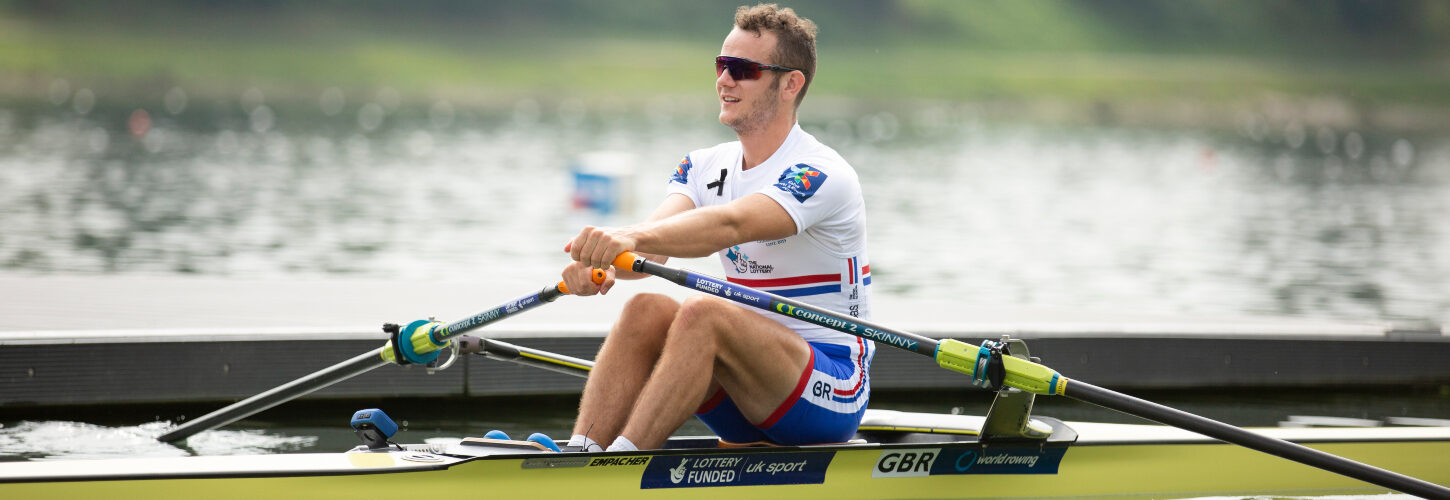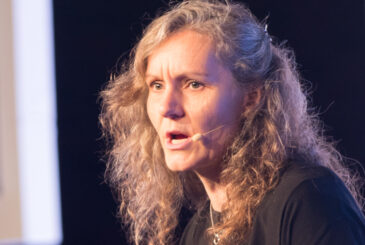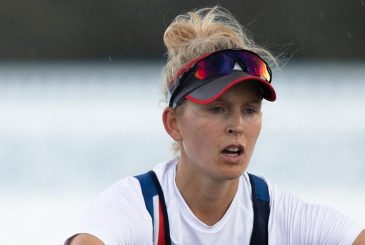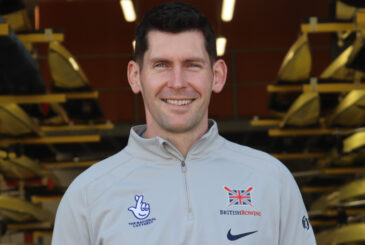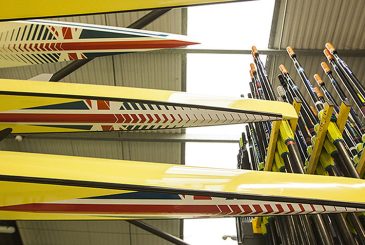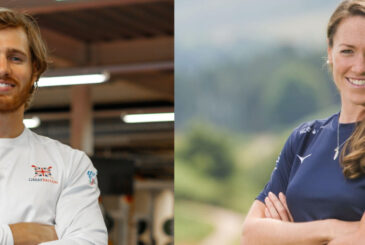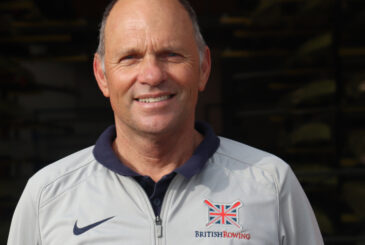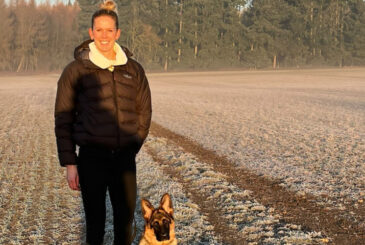Sam Mottram is racing with Jamie Copus in the lightweight men’s double sculls at the European Rowing Championships this weekend. Rebecca Charlton finds out about his rowing journey
Twenty-six-year-old GB lightweight rower Sam Mottram is one of only two rowers in the men’s lightweight squad. He talks about the upcoming European Championships and Olympic qualification with the lightweight men’s double, life as a lightweight rower, and how he first became hooked on the sport.
Rebecca Charlton: So, what initially sparked the flame for rowing?
Sam Mottram: I’m one of seven kids, from quite a big family and we used to always be super-active, and we’d do everything – running, rugby, athletics, swimming, absolutely all sports.
My sister got to that age when she got a bit too cool and didn’t want to do sports anymore, so my parents said: “Oh right, well you can get rid of all the sports, but you still have to do one”. She thought she’d be smart about it and picked a more obscure sport, which was rowing.
RC: So, it went well?
SM: She started at the rowing club and it turns out she was quite good at it! She went on to have quite a lot of success and represented GB in the Youth Olympics quite a long time ago. Then slowly, one by one, everyone in my family moved over.
My older brother rowed in the lightweight squad for a while, long before I got there and then everyone drifted over to it. As we grew up, we just kind of faded away from the other sports and rowing showed the way, as it were.
“We said goodbye to really close friends, one at a time, and it left just three of us”
RC: Did you see a career path in rowing, early on?
SM: No, it’s a hobby that got out of hand! I’d go racing at the weekend, I’d win here and there and it just sort of carried on really. I never really had a lot of luck in trials and stuff as a junior – it was only when I was a senior that I could race lightweight and I found my niche.
RC: What’s the biggest thing you’ve learned from a coach?
SM: To take it all in. A good coach will guide you and lead you in the right direction, but I think a lot of lessons can only ever really be learnt and not taught.
A coach could say the same thing time after time and you just can’t figure it out. You can try and try and try, but it just won’t happen and then, all of a sudden, one day you’ll be going along and you make it happen, or something tweaks and you finally get the answer. You think ‘yeah, that’s how it feels and that’s how it works’ and from then on you’ve achieved it.
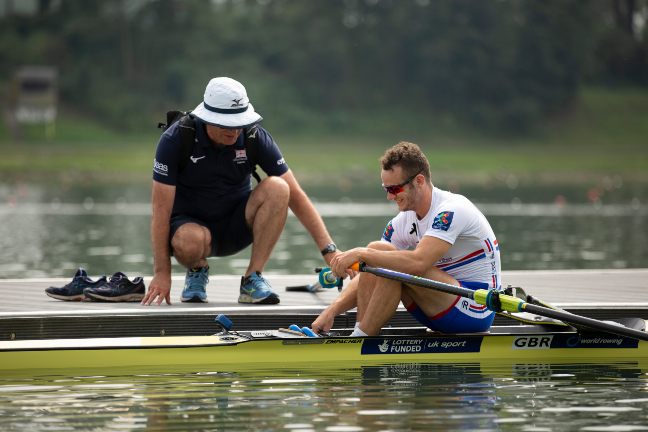
RC: What would you say was your breakthrough moment?
SM: The biggest difference was probably at club level. I moved from my club at Upper Thames and I was allowed to join Leander juniors. There were only four of us at the time, so it was a really nice little group.
I think that was probably the first time I it seemed that I may be going somewhere; the first time I felt i could actually compete in the upper echelons of the sport.
RC: What does it take to stay at the top as a lightweight rower, when there’s so few places in the lightweight squad?
SM: Over the last Olympiad, we’ve lost the lightweight men’s four which has taken the numbers from six or seven – if you include a spare – down to two rowers, so it’s been quite an interesting ride.
It’s almost a battle of survival to not get kicked out and you’re the only two or three rowers left doing it. We said goodbye to really close friends, one at a time, and it left just three of us which was then going down to two rowers basically.
“I’m very grateful to be able to race, especially when most sports can’t even do anything”
RC: That sounds like a process that takes its toll…
SM: There was a stage for a fair-long while when I was doing my apprenticeship where I’d wake up at five-ish, maybe a bit earlier, get in the car drive to Leander, go out on the water just after 6:30.
Then I would finish there, drive to work, work a full day from eight until five or six o’clock, turn around and go back to Leander for another session, before finally driving home at eight or nine o’clock.
That was it – every day for 18 months day-in-day-out – now it kind of seems relatively easy by comparison!
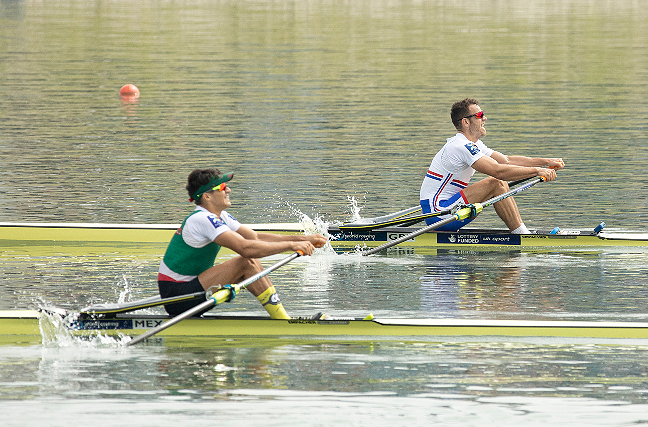
RC: And how do you feel about racing in the Europeans?
SM: You always want more race experience, but at the same time these are the cards you’re dealt and everybody’s in the same boat – everyone we are racing, more or less, hasn’t for well over a year. It’s just part and parcel of it.
RC: After finishing fifth at the 2019 Worlds in the lightweight single, a non-Olympic category, you are now competing in the lightweight men’s double. Where are you at with the Olympic qualification selection process for this boat?
SM: The qualification regatta [15-17 May in Lucerne] will only be one race away from the Olympics, so the best-case scenario is that we get three regattas this year. It’s limited, but you always live to race – that’s why we do it.
Very few people enjoy getting up and training every single day and dieting and weighing in, and all that side of things; it’s not quite so fun. You do it for the racing and you do it for the experience.
I’m very grateful to be able to race, especially when most sports can’t even do anything.
Photos: Nick Middleton


